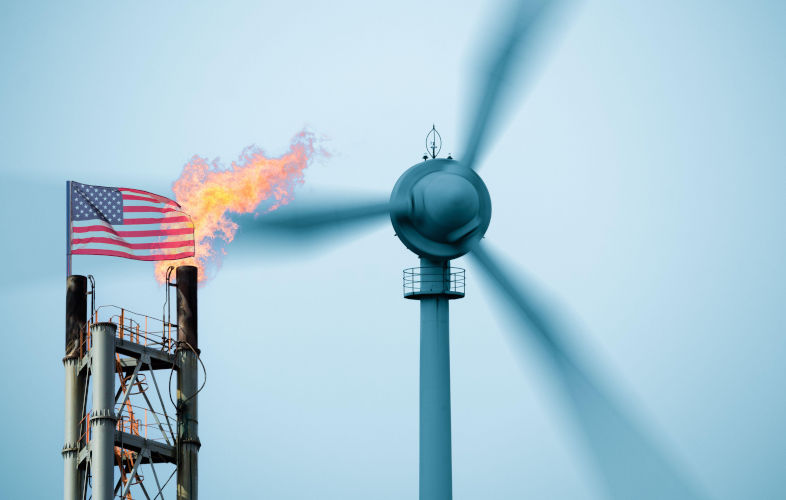Donald Trump does not accept that climate change is a real and significant phenomenon. In fact, he has said those who propound it are perpetrating the “greatest hoax” in the history of the world.
His view is probably shaped by the fact that dealing with climate change would get in the way of his model for industrial and, indeed, societal success, which leads him to the mantra of “Dig, baby, dig” for fossil fuels to promote more of the growth which he equates with success of the kind enjoyed by the US in his lifetime. As an individual who values profit-making in the marketplace above all else, it is no surprise that Trump places little value on environmental quality and its sustainability.
Trump has company, worldwide and in Australia, in his view of climate change. Tony Abbott, Australian prime minister from 2013 to 2015, famously declared that climate science was “complete crap” and strenuously opposed efforts to rein in emissions of greenhouse gases. Abbott simply did not believe that atmospheric warming was either occurring or could be problematic. His view still has support on the political right, as the current debate on the shelving of the goal of “net zero” by 2050 indicates.
The trouble is that climate change is occurring in reality and in ways that we should regard as worrisome. One of its outcomes is the rise in average sea level, now exceeding 20 cm since 1880 and increasing at an increasing rate over recent decades. Some parts of the globe are not experiencing it, for example the countries of Scandinavia where isostatic rebound (uplift) has occurred since the removal of the weight of ice at the end of the last ice age. Conversely, some parts of the globe have experienced more than the average rise. The very existence of some low-lying nations, especially in the Pacific Ocean, is at risk from sea level rise.
The reality of sea level rise is neither controversial in scientific circles nor difficult to understand in lay terms. The ice sheets of Greenland and Antarctica are melting and thinning, the area of ocean covered by sea ice is shrinking and most of the world’s mountain glaciers are in retreat. These phenomena are easily measured. Increased atmospheric and oceanic temperatures drive them and appear to be attributable in large part to increased greenhouse gas concentrations in the atmosphere caused by human activities, especially the burning of fossil fuels.
Trump accepts none of this. He has a track record of debunking science, as shown by his advocacy for injecting people with bleach to defeat COVID-19 during his first term as US president and, more recently, by his opposition to the pain-killer marketed in Australia as paracetamol which he argues might promote autism in babies. Now climate change is in his sights, and he is determined to cut investment in research in the relevant areas of science. Given his world view and his ability to promote what he wants to believe, the positions he takes are not surprising.
Where does Trump’s failure to accept climate change as real and problematic lead? It discourages the development of our understanding of climate change, and limits the application of coping strategies, whether by way of reduction in greenhouse gas emissions or by adaptation to the changed conditions or mitigation of their impacts.
Yet climate change is a perennial feature of the planet. Not long ago in geological time, there were the ice ages, when vast amounts of the Earth’s water were locked up in the polar ice caps and average sea levels were tens of metres lower than they are now. With temperature increases and the resultant melting, the rising sea level caused the east coast of the Australian continent to retreat by several kilometres, a forerunner of the coastal erosion we see episodically today.
We also see expansion of the “climate tropics”, whereby areas slightly poleward of the Tropic of Capricorn are taking on climates more tropical than hitherto, and changes in the locations of the pressure belts cause changes in rainfall patterns. The south-west of Western Australia and the nation’s south-east (Victoria and the New South Wales Riverina) have experienced declines over many years in winter rainfall. This has brought consequences for agriculture, the genesis of bushfires and the maintenance of water supplies for human use.
Trump is an old man; he turns 80 next year. He will not live to see the dire impacts that a continuation of climate change brought about by global heating might bring, but his grandchildren certainly might, especially if sea levels keep rising. Many of the world’s big cities, Miami near Trump’s Mar-a-Lago likely among them, will have serious problems which with to contend. He seems unaware of, and indifferent to, these possibilities. Determined to make the world do his bidding, he presses on to rid his own country of emissions reductions. He may well pressure other countries to walk away from their support for research into climate change.
Trump believes in his preferred reality, on which he constructs the future he wishes to see. He runs his world, and the world he wants, on what were labelled in his first presidential term as “alternative facts”. Science, in contrast, seeks to uncover actual reality and, in doing so, gives governments tools to deal with that reality as it is and as it is likely to become. The worst impacts of Trump might be to deny governments the opportunity to contend with the most dangerous problem the world could face: climates that are altered and affecting humanity in difficult ways.
The views expressed in this article may or may not reflect those of Pearls and Irritations.
Chas Keys is a former academic and Deputy Director General of the NSW State Emergency Service who writes about floodplain management, climate change, the culture, ethics and politics of cricket and other matters. He is a member of the Emergency Leaders for Climate Action (ELCA)

